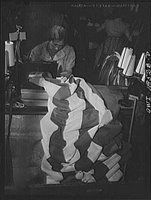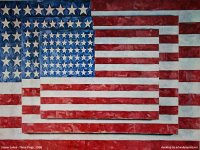 I've been thinking a lot about my last post. The 4th of July always turns my thoughts toward patriotisim and nationalism and the symbolism of the flag. Patriotism was a cornerstone of my upbringing. Nationalism, not so much. I got to see more of the world as a child than most people see in a lifetime and those opportunities led to more of a feeling of universalism than of nationalistic pride. The differences between "us" and "others" are a product of culture, not nationality and culture is deserving of respect.
I've been thinking a lot about my last post. The 4th of July always turns my thoughts toward patriotisim and nationalism and the symbolism of the flag. Patriotism was a cornerstone of my upbringing. Nationalism, not so much. I got to see more of the world as a child than most people see in a lifetime and those opportunities led to more of a feeling of universalism than of nationalistic pride. The differences between "us" and "others" are a product of culture, not nationality and culture is deserving of respect.Actually, I have to say that summer, starting with Memorial Day (which is coincidentally when I celebrate my wedding anniversary), including Flag Day (which inspires all manner of political posturing amongst congressional representatives trying to buy political cache with proposed legislation to protect American values in the form of flag burning amendments, etc), and carrying through to Labor Day seems choreographed to the tune of Stars and Stripes Forever...
I'm hyper-aware at this time of year of the faded bumper stickers and tattered flags being so negligently displayed on ill-maintained trucks and bustling businesses. I was raised to believe that the flag stood for something, that it should be displayed with pride, and that its care should be respectful and ritualized. A flag that drags the ground should be destroyed, as should one that has been soiled or torn.
Under ideal circumstances, the flag is a symbol, of the values we claim as a nation, of our history, our future, our dreams and accomplishments. At other times, the flag is a point of contrast used to highlight our failures, our greed, our imperialism, and our sometimes overwhelming arrogance.
 This concept of flag as symbolic vocabulary is why it has sometimes been a popular motif in both folk art and fine art... Whether you're talking about the work of Jasper Johns (like the image at left) or more politically vocal pieces like those of Faith Ringgold, an image of the flag in art jump starts the dialogue between artist and viewer by providing some common vocabulary.
This concept of flag as symbolic vocabulary is why it has sometimes been a popular motif in both folk art and fine art... Whether you're talking about the work of Jasper Johns (like the image at left) or more politically vocal pieces like those of Faith Ringgold, an image of the flag in art jump starts the dialogue between artist and viewer by providing some common vocabulary.In the same way that the Military Brats documentary explores the contrast between the lifestyle and restrictions of base life and the ideals that the military exists to protect, I am torn between the flag as a powerful metaphor with symbolic significance and my innate respect for that symbol, the values it represents, and the importance of the very ideals to which my childhood served as ambassador. I am very upset with certain aspects of our current administration's foreign policy, and yet I cannot allow myself to use the imagery of the flag as the vocabulary of my protest. Nor am I comfortable trivializing the flag and its symbolism by incorporating it, or its elements, in works of negligible significance.
Thank you to Serena Fenton of Layers of Meaning for a thought provoking post.
First image: "Verona, New Jersey. Sewing stripes on an American flag at the Annin Flag Company"1943 Mar. Collins, Marjory, 1912-1985, photographer. Farm Security Administration - Office of War Information Photograph Collection (Library of Congress)





